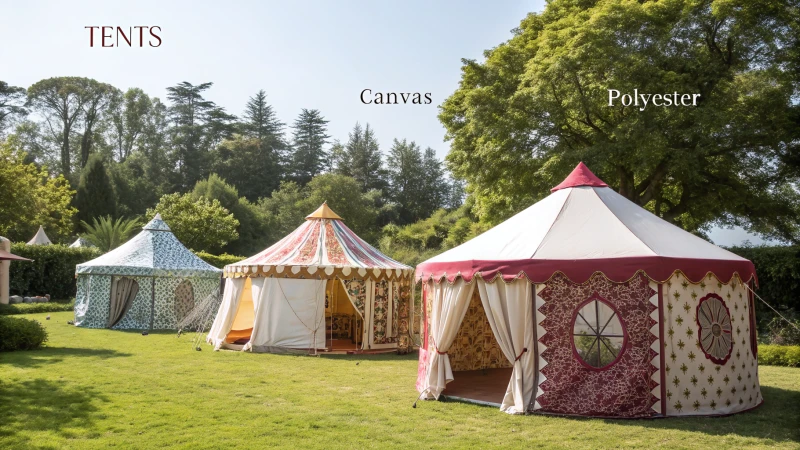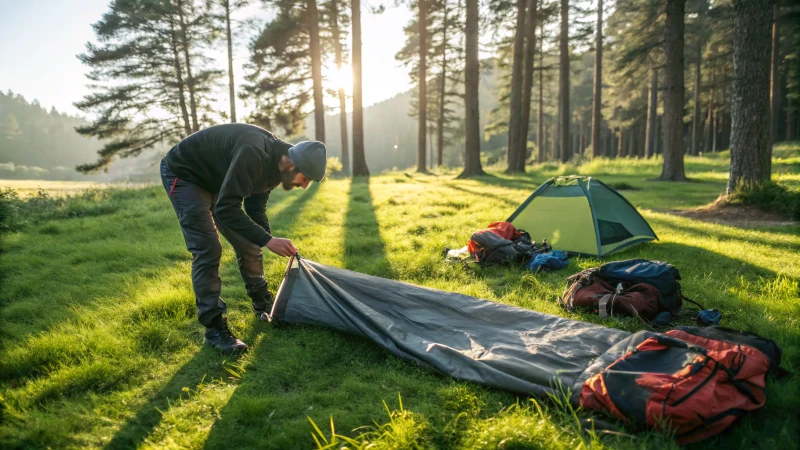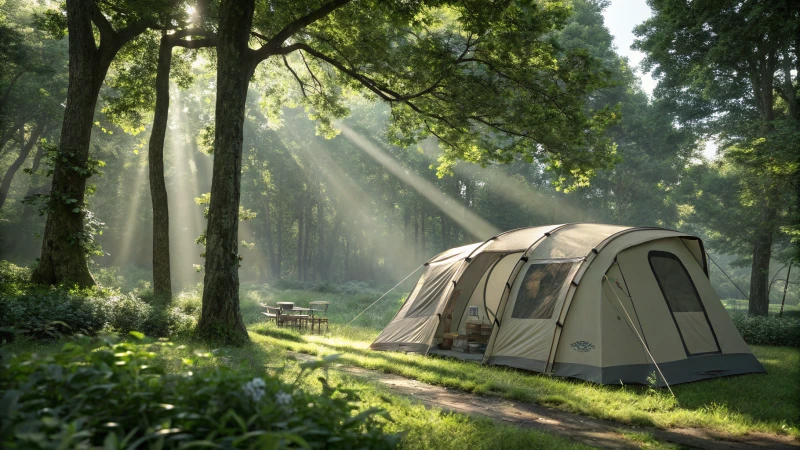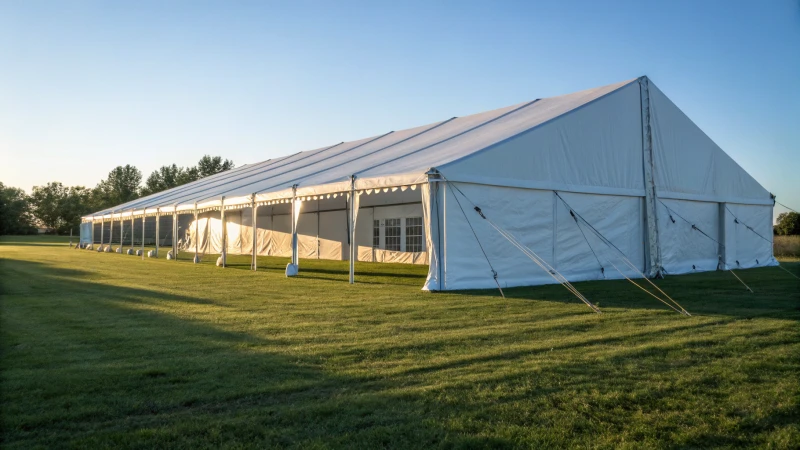
Dreaming of starting a tent rental business? Let’s turn that vision into reality together!
To successfully launch a tent rental business, start with thorough market research to grasp demand and competition, craft a detailed business plan, invest in top-quality equipment, and establish a strong online presence. Prioritizing exceptional customer service is crucial for repeat business and glowing referrals.
I remember when I first considered diving into the tent rental business. It wasn’t just about providing shelter; it was about creating memorable experiences for people celebrating life’s big moments. As I explored the market, I realized that understanding local demands and finding gaps where I could offer something unique was key. Crafting a business plan felt like sketching the blueprint of my dreams, considering every detail from pricing to marketing strategies. Investing in quality tents was non-negotiable—they had to withstand anything Mother Nature threw at them. Building an online presence became my way of reaching out, sharing stories of past events, and connecting with potential clients. Above all, focusing on customer service has been my secret sauce, turning first-time clients into lifelong partners. It’s been a journey of learning and growth, each step bringing me closer to my vision.
Comprehensive market research is crucial for a tent rental business.True
Understanding demand and competition ensures effective strategy planning.
Customer service is less important in the tent rental industry.False
Excellent service leads to repeat business and positive referrals.
How Can Market Research Transform Your Tent Rental Business?
Imagine transforming your tent rental business into a local favorite through the power of market research.
Market research is the secret weapon for a thriving tent rental business. By revealing customer desires, evaluating demand, and spotting market voids, it empowers businesses to craft services that truly satisfy clients and boost profits.

Understanding Customer Preferences
When I first started out, I was surprised by how much I learned just by listening to customers. Some were passionate about unique tent designs1, while others prioritized extras like lighting or flooring. It became clear that understanding these preferences would be key. Tailoring my inventory to meet these diverse needs not only delighted my clients but also made my business stand out.
Assessing Market Demand
I remember attending a local fair and realizing just how many events happened in my area throughout the year. This insight led me to dig deeper into event calendars and seasonal trends, which was eye-opening. By creating a demand forecast2, I could efficiently manage my inventory and staffing, ensuring that I was always prepared for busy seasons.
Competitor Analysis
One afternoon, while browsing online, I stumbled upon a competitor’s website. This accidental discovery turned into a strategic advantage as I began analyzing their offerings. I identified gaps in the market3 where my business could excel, like offering personalized pricing strategies and unique service options that they hadn’t considered.
Exploring New Opportunities
Market research isn’t just about competition; it opens doors to new possibilities. By collaborating with event planners and tapping into niche markets, I found fresh revenue streams. These partnerships not only increased my visibility but also established my brand as a go-to solution for diverse event needs.
Adapting to Industry Trends
Keeping up with industry trends felt like being on a roller coaster, but it was worth the ride. Whether it was eco-friendly materials or avant-garde tent designs, staying informed helped me keep my offerings relevant. By embracing emerging trends4, my business remained competitive and in tune with client expectations.
| Aspect | Market Research Insight |
|---|---|
| Customer Preferences | Tailor services to unique client needs |
| Market Demand | Optimize inventory based on event frequency |
| Competitor Analysis | Identify strengths and weaknesses of competitors |
| New Opportunities | Explore partnerships and niche markets |
| Industry Trends | Adapt offerings to match current event trends |
Market research identifies unique tent designs demand.True
Research helps understand customer preferences for unique tent designs.
Ignoring market trends benefits a tent rental business.False
Staying informed about trends is crucial to remain competitive.
What Should Be Included in Your Tent Rental Business Plan?
Have you ever thought about diving into the tent rental business? It might seem like a giant leap, but trust me, with the right plan, you’re halfway there!
A successful tent rental business plan should encompass an executive summary, market analysis, service offerings, marketing strategy, financial projections, and operational plans. These elements collectively ensure your plan is both comprehensive and actionable.

Executive Summary
When I first sat down to write my business plan, I knew I had to start with a bang—the executive summary. It’s the first thing people read, and I wanted it to reflect my enthusiasm and vision for the tent rental business. This is your chance to outline your goals, the unique flair your tents bring to events, and why you’re the best choice for weddings or corporate gatherings. Keep it concise, yet make sure it shines with your passion and promise.
Market Analysis
I remember the days I spent immersed in market analysis. It wasn’t just about numbers; it was about understanding people—my future clients. I looked at weddings, festivals, and even those massive trade shows. It was all about knowing who needs a tent and why. A SWOT analysis5 became my best friend, helping me pinpoint where I could stand out with unique designs or additional services like dreamy lighting setups.
| Aspect | Details |
|---|---|
| Target Market | Weddings, corporate events, festivals, trade shows |
| Competitors | Existing rental companies, direct tent sellers |
| Opportunities | Unique designs, additional services like flooring and lighting |
Service Offerings
Defining what my business would offer was a journey of creativity. From elegant weddings to bustling festivals, I knew I needed to cater to various event types. What excited me most was thinking about additional services—imagine custom setups that could transform any space into something magical.
Marketing Strategy
Creating a marketing strategy6 was like mapping out an adventure. I visualized how to reach those clients who were searching online late at night for the perfect tent. Social media became a playground for showcasing stunning setups and forming partnerships with event planners who shared my vision of creating unforgettable experiences.
Financial Projections
I won’t lie—financial projections felt daunting at first. But once I broke it down into startup costs and potential revenue streams, it became a roadmap to success. I learned how crucial it was to not only dream big but also plan for when the business would break even and start flourishing.
| Financial Aspect | Estimated Cost/Revenue |
|---|---|
| Startup Costs | $50,000 – $100,000 |
| Monthly Revenue | $10,000 – $15,000 |
| Break-Even Point | Within 12-18 months of operation |
Operational Plans
And then there were the operational plans—the nitty-gritty details of how the business would run daily. From logistics to setup, maintenance to staffing, I knew these plans needed to be rock-solid. They had to be flexible too, ready to grow with the business and adapt to future possibilities.
Getting these elements down on paper was like building a dream on a firm foundation. It’s what will guide you from that initial spark of an idea to a thriving tent rental venture that brings joy to every event it touches.
Market analysis includes SWOT evaluation.True
The context specifies incorporating a SWOT analysis in market analysis.
Tent rental startup costs exceed $150,000.False
Startup costs are estimated between $50,000 and $100,000.
Why Is Investing in Quality Equipment Crucial for Success?
Have you ever wondered why some businesses seem to effortlessly thrive while others struggle? It often boils down to one critical factor: the quality of the equipment they invest in. Let’s dive into why choosing the right tools can make all the difference.
Investing in quality equipment means securing durability, efficiency, and reliability, which cuts long-term costs and boosts productivity. This investment not only leads to better outcomes and customer satisfaction but also offers a significant competitive advantage in the market.

I remember when I first started my journey in the tent rental industry. Like many, I was tempted to cut corners and save on initial expenses by opting for cheaper equipment. But that decision quickly turned into a series of headaches with frequent breakdowns and unsatisfied clients. That’s when I realized that investing in quality equipment wasn’t just a choice; it was essential for success.
Enhancing Productivity and Efficiency
High-quality equipment is like having a reliable partner that never lets you down. It often comes packed with the latest technology, which means tasks are completed faster and more accurately. I’ve seen firsthand how efficient equipment can help meet tight deadlines7 and boost overall productivity. Plus, fewer breakdowns translate into significant cost savings.
Long-term Cost Savings
Initially, the price tag on quality equipment might seem daunting. But trust me, it’s worth every penny. I learned this when I compared maintenance costs over time. While cheaper tools demanded constant repairs, my high-quality machines ran smoothly, cutting down on operational expenses significantly.
| Cost Comparison | Low-Quality Equipment | High-Quality Equipment |
|---|---|---|
| Initial Cost | Lower | Higher |
| Maintenance Costs | High | Low |
| Lifespan | Short | Long |
Improving Product Quality
Using superior equipment has transformed the quality of products and services I offer. Customers notice the difference, and it reflects in their satisfaction and loyalty. In industries where precision is crucial, like manufacturing or tent rental, quality can be your strongest selling point8.
Ensuring Safety and Compliance
In my line of work, safety can’t be compromised. Quality equipment aligns with industry standards, minimizing risks of accidents and legal issues. It’s comforting to know that my team and assets are protected, fostering a safe working environment.
Adapting to Technological Advances
Staying competitive means embracing new technologies. Investing in quality equipment allows me to integrate advanced features that keep my business ahead of the curve. It’s an exciting journey of continuous improvement and innovation9 that I’ve come to appreciate.
In hindsight, choosing quality over cost was one of the best decisions I’ve made for my business. It’s not just about having better tools—it’s about building a foundation for long-term success.
High-quality equipment reduces downtime.True
Quality equipment breaks down less often, minimizing downtime and boosting productivity.
Low-quality equipment has a longer lifespan than high-quality.False
High-quality equipment is designed to last longer, reducing replacement frequency.
How Can You Build a Strong Online Presence for Your Tent Rental Business?
Building a strong online presence for your tent rental business is more than just a strategy; it’s a chance to share your story and connect with clients in meaningful ways.
To build a robust online presence, focus on a user-friendly website, active social media engagement, and consistent branding. Interact with your audience through quality content and prompt responses.
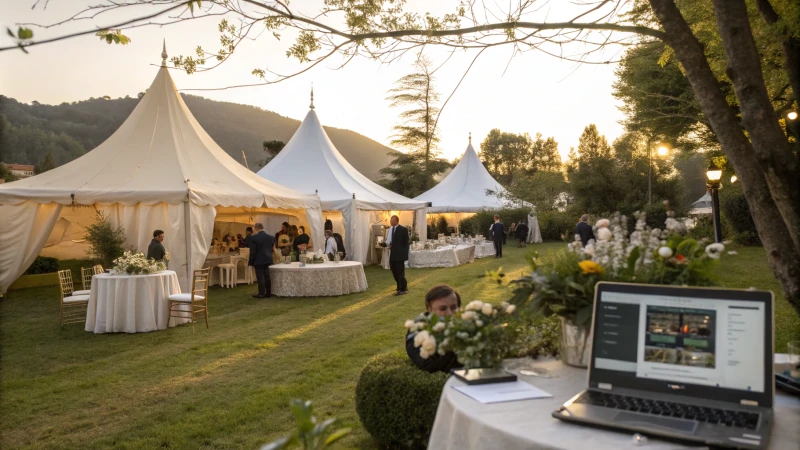
Optimize Your Website for Visibility
When I first started building my online presence, making my website user-friendly and mobile-responsive was a game-changer. I remember staying up late, tweaking layouts and testing page speeds—knowing every second counted when someone clicked through. Using tools like Google Analytics10 helped me understand what visitors wanted. It was like unlocking a secret map to their needs! Regularly updating my blog with informative content11 about event planning not only brought in traffic but also established my authority in the industry.
Harness the Power of Social Media
Social media became my virtual showroom. I’d post stunning photos of our tents set against sunset backdrops or bustling events, instantly transporting followers into the moment. Platforms like Instagram and Facebook weren’t just places to post—they became communities. Whenever someone commented or messaged, I made sure to reply promptly. Creating a content calendar was crucial; it ensured I was consistent without feeling overwhelmed. And targeted ads? They were like having a billboard in the right neighborhood at the right time.
Engage with Your Audience
I encouraged customer reviews and testimonials—it felt vulnerable at first, but soon, those stories became my business’s lifeline. Each positive review wasn’t just words on a screen; they were echoes of trust resonating with potential clients. Hosting webinars or live Q&A sessions allowed me to connect directly with people, turning abstract data points into real faces and voices. This approach transformed my brand into a trusted name in the tent rental industry.
Consistent Branding Across Channels
Consistency became my mantra. From the logo to the color scheme and tone of voice, every piece of content shared the same heartbeat. Crafting a compelling brand story that resonated with my target audience was like writing a novel, each post adding another chapter. This cohesion not only reinforced our message but attracted more potential clients12 who felt they knew us before we even met.
A mobile-responsive website enhances SEO for tent rental businesses.True
Mobile responsiveness improves user experience, boosting search engine rankings.
Ignoring social media has no impact on online presence.False
Social media is crucial for engagement and reaching broader audiences.
Conclusion
Launching a tent rental business involves market research, a solid business plan, quality equipment investment, strong online presence, and exceptional customer service for success.
-
Learn about trending tent designs that could set your business apart from competitors. ↩
-
Discover techniques to predict rental demand and manage inventory effectively. ↩
-
Find ways to differentiate your services from competitors by addressing market gaps. ↩
-
Stay updated on new trends that can enhance your offerings and attract more clients. ↩
-
This link provides in-depth insights into conducting effective market analysis specific to tent rental businesses. ↩
-
Explore strategies to effectively market a tent rental business through this informative resource. ↩
-
Learn how investing in high-quality equipment enhances productivity through reliable performance and reduced downtime. ↩
-
Discover how high-quality equipment can elevate your product standards and customer satisfaction. ↩
-
Explore the role of advanced equipment in fostering innovation and keeping businesses competitive. ↩
-
Google Analytics provides insights into website traffic and user behavior, helping optimize online strategies. ↩
-
Informative content attracts visitors, improves SEO ranking, and establishes authority in the industry. ↩
-
Consistent branding builds recognition and trust, making your business memorable to clients. ↩


